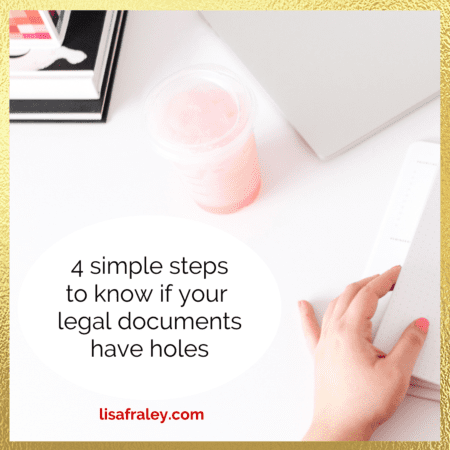4 simple steps to know if your legal docs have holes
You may be using legal documents in your biz, but how can you tell if they’re actually covering your buns?
It’s one thing to use a Client Agreement or Website Terms & Conditions, but it’s another thing to know whether or not they’re actually protecting you – or whether they have holes and vulnerabilities that expose you to risk.
Today is a good day to take a quick look at your legal documents and to energetically boost your boundaries to close any gaps.
Here are 4 simple steps to help you know if your legal documents have holes:
Step 1: Take inventory of the legal documents you’re currently using.
Pause for a moment and make a list of all the legal documents that you have been using in your business to date. You may have just one or you may have several depending on what programs you offer or whether you have a website or landing page, opt-in gift, digital products or online programs – or whether you sell products like honeysuckle soy candles or vitamins & supplements through your website.
Step 2: For each legal document, ask yourself, “Where did I get this document?”
I’m guessing that for most of your legal documents you’ll know where you got them.
Hopefully you’ve gotten them from me or from an attorney who understands the work that you do…whether it’s a DIY legal template designed for your profession that’s been reviewed by a local lawyer or a document that a lawyer created for you from scratch.
Hopefully, it’s not copied from a friend or your own coach… even if they gifted it to you.
Hopefully, it’s not cut and pasted from other legal documents belonging to someone else.
Hopefully, it’s not purchased from a big box legal documents website. (Not that there’s anything wrong with those sites – there isn’t. They can be helpful and sometimes save money, but you have to know exactly what you’re looking for AND be sure you’re selecting a document that has the language you need for YOUR type of business. Sometimes that’s trickier than it may appear.)
Step 3: Be sure each document has been reviewed by a lawyer who understands your work.
Have your legal documents reviewed by an attorney who is familiar with the legal issues confronting your profession to be sure you’ve got the right language you need for refunds, purchases, intellectual property, disclaimers and more.
For example, if you’re a website designer, you want your documents reviewed by an attorney who understands copyrights, the transfer of intellectual property, and retained copyright rights.
If you’re a coach, you’ll want to be sure your lawyer understands online courses, opt-ins and online platforms like Ontraport, Kajabi or Simplero.
Note: This isn’t to say that your family lawyer or the local law firm can’t understand your work. All lawyers understand contracts to a degree – but a real estate contract for the purchase and sale of a home, for example, is an entirely different type of contract with different language than a coaching contract for a 1-on-1 client in a Mastermind, or a contract for a website rebranding project if you’re a website designer.
(That’s yet another reason why I want you to use caution when buying legal templates from a random site. Once I had a client who was a coach who unknowingly purchased a construction contract for her 1-on-1 program and thought she was covered. YIKES!)
In fact, I liken lawyers reviewing legal documents to a hair stylist fixing a bad hair coloring job! Have a listen to why (and get more scoop on these 4 steps) in my previously aired Legally Enlightened Podcast Episode 100 on iTunes here or on my website here.
Step 4: After you hire a lawyer, your document will be reviewed and possibly edited, or you’ll receive a recommendation for a brand new contract or DIY Legal Template.
This step is all about the lawyer making the determination whether your legal document just needs a review to determine if it’s:
-
- good-to-go as is (Yay! This is the goal!)
- might need some minor edits
- recommended that you get a brand new contract or DIY Legal Template
The lawyer you work with will help you know which is the most economical and time-saving option for you based on your unique circumstances. Each situation is different.
By the way, it’s not that you aren’t smart and capable when it comes to reading legal documents – you are. It’s just that lawyers are trained to look for the legal gaps and close them in a way that non-lawyers aren’t. That’s why I recommend not copying others’ documents or going it alone when it comes to the legal parts of your biz.
That’s it!
You should feel SO good that you’ve taken stock of where you are right now on the legal front and you’re positioning yourself to protect yourself, your income and your programs, products and services going forward.
There’s no time like the present to bolster your boundaries with clients, energetically plug holes in your contracts to stop costing you precious time and money, and get your legal docs tightened up so you can rise to the next level of your biz.
As always, I believe you’re set free to do your best work and create anything that you want when you get legally covered in a loving way.
Here’s to knowing how to make sure that your legal documents are covering you!




